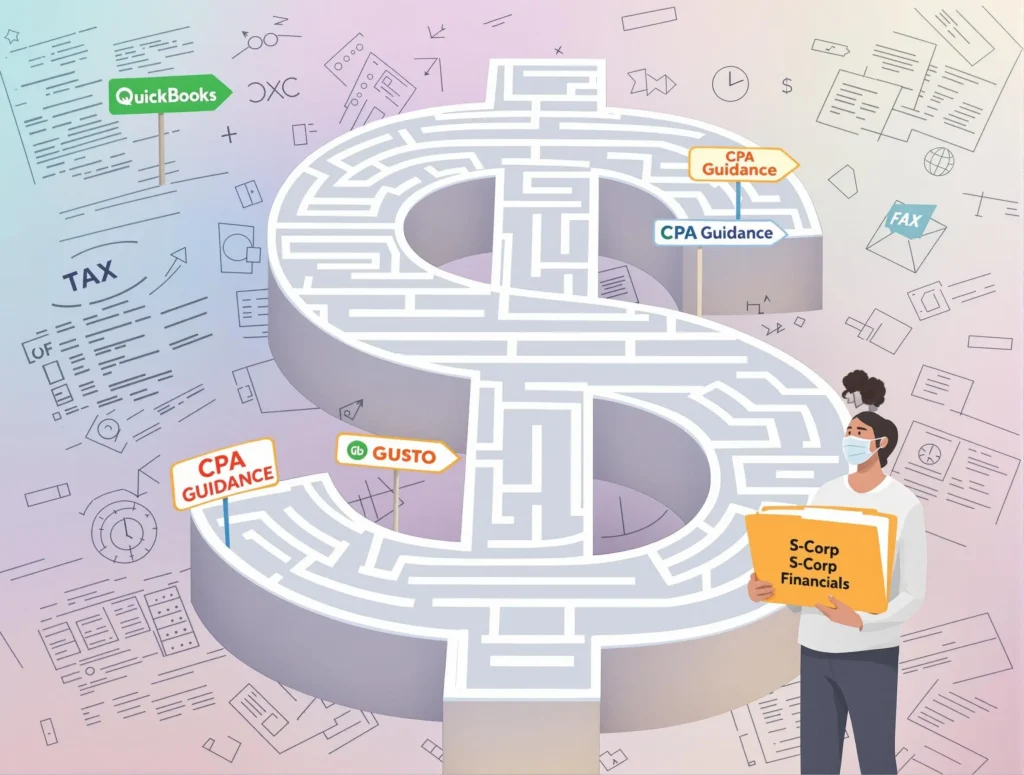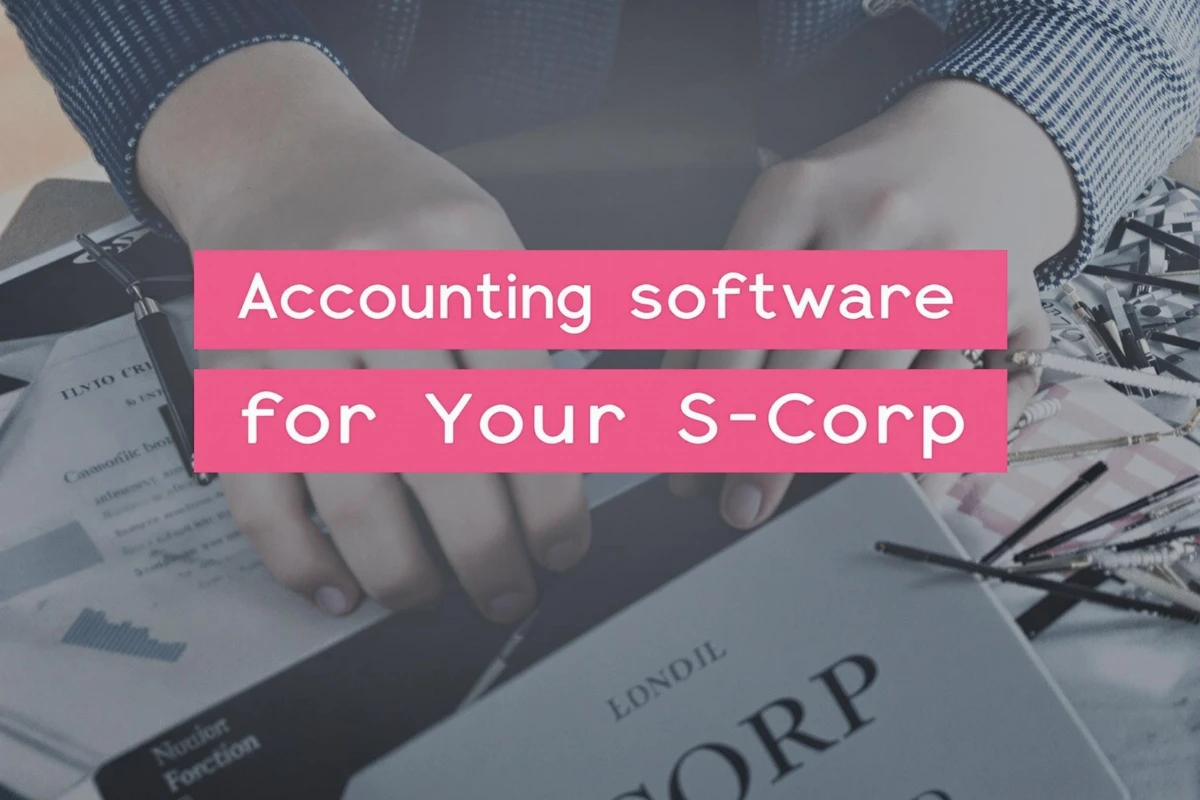When I transitioned from being a struggling freelancer to running my own S Corporation as a therapist, I knew the financial side would be a whole new ballgame. I never anticipated how complex bookkeeping and payroll could become. My adventure into the world of accounting software has been a path filled with ups and downs, but I’m here to share my story and the valuable insights I’ve gleaned from my experience.,
Understanding S Corps and their Unique Bookkeeping Needs
What is an S Corporation?
An S Corporation, or S Corp, is a special tax designation for small businesses. This structure allows profits to be passed through to shareholders, avoiding double taxation. So, instead of the business getting taxed and then the owners paying taxes again on their distributions, the income is reported only once on the owners’ personal tax returns. Pretty neat, right?
- S Corps can save you money on taxes.
- They limit your personal liability.
Unique Financial Responsibilities
S Corps have distinct financial responsibilities that set them apart from sole proprietorships or partnerships. For example:
- Shareholders must pay themselves a reasonable salary.
- Shareholders also need to handle distributions properly to avoid tax penalties.
This doesn’t even touch on bookkeeping and payroll responsibilities. As S Corp owners, we need to keep detailed records, especially with varying income and unique expenses.
The Importance of Accurate Bookkeeping in Therapy Practices
For therapists like myself, accurate bookkeeping is not just a tedious task; it’s vital. The unique expenses we incur—like conference attendance, training, or even travel for workshops—must be documented carefully. Without proper records, I could easily miss out on deductible expenses come tax time. And as we all know, missing deductions can mean money left on the table.
In fact, I recall transitioning to an S Corp and being overwhelmed by the paperwork. I thought I knew what I was doing, but the reality hit hard. I hired a CPA but realized that I needed deeper bookkeeping support. Now, finding the right accounting software for Chapter S Corp was a game-changer for me.
My Transition Anecdote
When I made the switch to an S Corp, I felt a mix of excitement and anxiety. While I was thrilled at the potential for tax savings, I was nervous about the added complexity. It wasn’t long before I understood that “Understanding your financial responsibilities is crucial as an S Corporation owner.” – Unknown. This quote resonates with me even now because it captures the essence of my experience.
Chart: Benefits of S Corporations
| Benefits | Approximate Percentage |
|---|---|
| Allows individual shareholders to avoid double taxation on corporate profits | 100% |
| Approximately therapists operate as S Corps | 10% |
As I navigated through my bookkeeping journey, I found the intricacies of managing an S Corp fascinating but complex. My experiences continue to teach me the value of diligent financial management.
Exploring QuickBooks: Pros and Cons

When it comes to accounting software for chapter S Corp, many small business owners, including therapists like us, turn to QuickBooks. It’s a household name in the bookkeeping world, and for good reason. So, what does it offer? Let’s dive into its features, frustrations, costs, and insights from fellow therapists.
Features Highlighted
- *Intuitive Invoicing:* Create invoices that look professional in minutes.
- *Expense Tracking:* Automatically categorize and track spending.
- *Payroll Management:* Simplifies payroll for small teams, pivotal for S Corps.
These features sound great, right? They can save time and reduce stress when managing our finances. But are there drawbacks? Let’s talk about that.
Common User Frustrations
While QuickBooks offers many features, users often express frustrations. Did you know that 50% of users report feeling overwhelmed by customer service? That’s quite a statistic!
Many find the software complicated. As one professional therapist noted,
“QuickBooks is powerful but can be a headache if you’re not tech-savvy.”
This insight resonates with many of us—as we juggle our practices, a steep learning curve is the last thing we need.
Cost Efficacy for an S Corp
Now, let’s evaluate the costs. QuickBooks Online starts at $25/month. For an S Corp, that can be manageable, especially considering the time it saves. However, it can add up quickly with additional features, and many find themselves seeking alternatives like Gusto for payroll.
Feedback from Fellow Therapists
Feedback from peers in our field is invaluable. Numerous therapists recommend using the Simple Start version, claiming it suits most needs. However, many caution against using QuickBooks payroll, as their customer service doesn’t always respond quickly enough to payroll issues.
| Service | Monthly Cost | User Frustration |
|---|---|---|
| QuickBooks Online | $25/month | 50% report being overwhelmed by customer service |
In conclusion, QuickBooks has its strengths and weaknesses. While it can efficiently handle bookkeeping, the customer support and complexity can be significant hurdles. Knowing the pros and cons helps us make informed choices, enabling us to focus more on our clients than on managing finances!
Alternatives to QuickBooks: Gusto and Beyond
Why Choose Gusto for Payroll?
When it comes to payroll, Gusto really stands out. It’s designed to make life easier for small business owners like us. Gusto simplifies payroll with features like automatic tax calculations and filings. Say goodbye to the headache of manually calculating taxes! It allows you to manage employee data effortlessly. Wouldn’t you want a tool that keeps track of employee benefits and compliance?
Another great feature of Gusto is the ability to generate W-2s and 1099s at the end of the year. Can you imagine how much time that saves? “Gusto is like the friend who makes taxes less stressful,” one therapist said. That’s spot on!
Exploring Other Alternatives
If Gusto isn’t quite right for you, consider other options such as Patriot and Quicken. Both software solutions offer useful features, though they cater to different needs.
- Patriot: Known for its budget-friendly pricing, it’s a solid choice for those who want to keep costs low. Their monthly cost is around $10, with additional fees for payroll features.
- Quicken: This software gives you comprehensive bookkeeping features at a fraction of the cost of QuickBooks, making it a good alternative for those on a budget.
Comparing Pricing
Now let’s talk about the pricing structures of these software options:
- Gusto: Their subscription starts at $39 plus $6 for each employee monthly.
- Patriot: About $10 per month, but essential payroll features cost extra.
- Quicken: Pricing varies, but it’s typically more affordable than QuickBooks.
My Personal Experience with Gusto
Having used Gusto myself, I can tell you it’s incredibly user-friendly. Setting up payroll takes just a few clicks. Plus, their support is fantastic. I’ve even received quick responses to my queries during busy periods.
While it’s essential to consider your specific needs when choosing a payroll solution, my experience has shown that exploring options like Gusto can significantly reduce the headaches related to handling payroll. With features designed specifically for our needs, why settle for anything less? It’s worth spending a little time evaluating these alternatives and finding the best fit for you!
Common Missteps in Using Accounting Software
Understanding Common Mistakes by New S Corp Owners
As a new S Corp owner, I can’t stress enough how crucial it is to get your accounting right from the start. Many of us stumble through this process, often making the same mistakes. Here are a few common missteps that you should be aware of:
- Misclassifying Employees: One of the biggest mistakes is thinking you can classify workers as both 1099 contractors and W2 employees. You simply can’t do that. A 1099 contractor is different from a W2 employee, and mixing them up can lead to serious tax issues.
- Poor Reconciliation Practices: Failing to reconcile accounts regularly is another pitfall. If I’ve learned anything, it’s that an inconsistent reconciliation can lead to discrepancies that take hours to fix later. Did you know it can take up to 10 hours a month to reconcile accounts if not done consistently?
- Ignoring Record-Keeping: Consistency in record-keeping is not just an afterthought. It’s essential for smooth operations. I found out the hard way that skipping this step creates chaos during tax season.
Employee Classifications: 1099 vs W2
It’s easy to confuse employee classifications. I see this happening often. This confusion not only puts you at risk for audits but can also lead to unexpected penalties. A staggering 49% of small business owners report making these kinds of mistakes. Are you making the same errors?
The Importance of Accurate Reconciliation
I’ve had experiences where I avoided reconciling accounts regularly, thinking I could catch up later. Spoiler alert: it never works! With much effort, I realized that doing it consistently saves time and headaches down the line. As an accounting professional once said,
“The smallest oversight can lead to the biggest headaches during tax season.”
Lessons Learned from Personal Oversights
Reflecting on my personal experience, I found that even simple oversights can lead to significant issues. It’s not just about balancing books. It’s about understanding the nuances of what you’re managing. Each small detail matters, and overlooking them can be costly.
By being aware of these common pitfalls, I believe we can create smoother operations as we manage our S Corps. Remember, early mistakes can be avoided with diligence and proper understanding. So let’s get it right from the start!
The Future of Your S Corp’s Accounting Journey

Have you ever felt overwhelmed managing your S Corp’s finances? You’re not alone. Many small business owners share this sentiment. But here’s the good news: the right guidance and tools can make the journey smoother.
1. Embrace Professional Guidance
Seeking help from a CPA or financial advisor is crucial. They bring expertise that can save you significant amounts of money—up to 20% on unnecessary tax payments! Imagine what you could do with those extra funds! Regular consultations can alleviate stress and enhance growth by ensuring your financial management is on point.
“Your journey doesn’t have to be taken alone; seek help when needed!” – Unknown
2. Stay Updated on Tax Laws
Tax laws are continually evolving. If you don’t keep up, you risk losing out or, worse, making costly mistakes. Continual education about these changes is vital for your financial health. There are online courses, webinars, and even local workshops dedicated to helping business owners like us.
3. The Evolution of Software Tools
Have you noticed how quickly technology evolves? Innovative accounting software is becoming more user-friendly and efficient. Programs like QuickBooks, Gusto, and Patriot are tailored for specific needs, making bookkeeping and payroll manageable.
But before you dive in, it’s worth evaluating what you currently use. Could it fit your growing needs? Consider taking time to assess your current setup. This process could save you time and headaches in the future!
4. Take Action
With resources and tools at our fingertips, managing your S Corp does not have to be a daunting task. It can actually be empowering! Connecting with a CPA and investing in reliable accounting software makes a world of difference.
Remember, the choices you make today will shape your business’s future. Don’t wait; take control of your financial journey. Let’s start this journey together, one informed step at a time!
TL;DR: Choosing the right accounting software for your S Corp can be daunting. In this blog, I share my journey navigating QuickBooks and Gusto, explore common pitfalls, and reveal alternatives that could save you time and money.




